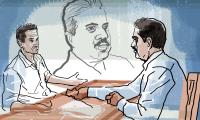Pakistan's ambassador to the United States has brushed aside contention that President Pervez Musharraf considered imposing a state of emergency as a means to grab power.
He said the move was in order to defeat extremism and terrorism and was constitutionally mandated.
"I think he is solidly in power. It was basically to defeat extremism, terrorism. That was the purpose that I knew of that they were thinking of because we've had a spate of suicide bombings. Basically, it was for that, not for power grabbing," Mahmud Ali Durrani told CNN.
"Declaring a state of emergency is a part of our constitution. It's not what people think it is. If a state of emergency was to be applied on Pakistan, it does not mean that the judiciary is going away or the parliament is going away or normal rights. It is for a limited period, limited time."
The top diplomat also said there were areas of disagreement regarding intelligence between the two countries, and maintained that contrary to assumption by the US, terrorist organisations believed to be hiding in Pakistan's border areas were not in a position to plan terror operations.
"Broadly speaking, I think the level of cooperation both at the operation level with our militaries and at the level of intelligence, I think is pretty good. There are areas of dispute, disagreement. And we need to tidy those over.
"I think what worries me most, is that Pakistan, or we say or I say that there are hideouts and there may be some Taliban. They are not in a state to plan operations. While your intelligence say there are safe havens. This is bad," the Pakistani ambassador said.
Stressing the need to bridge the gap in intelligence sharing between the two countries, Durrani claimed that even though the US has better electronic intelligence, Pakistan is far better in terms of human intelligence.
"We're two serious allies. If the difference is so great, I think this doesn't speak well. I think this is the bridge, the gap that needs to be bridged between the two intelligence areas," he said.
"Our human intelligence in our area is obviously much better. There is no debate about that. You see, because we have been a part of that area. That is part of our country.
We know the people. We can go in. Let's say, if you put in somebody, he'll stand out like a sore thumb," Durrani added.
"So our people know the history, the geography, the people and the current situation. So obviously, they have better human intelligence, as they call it. And you have, of course, the advantage of better satellite and electronic intelligence.
What I'm saying is a combination of both will take us places, rather than accusing each other. That won't help us one bit," the Pakistani envoy noted.
Asked where al Qaeda chief Osama bin Laden is, Durrani replied, "I can only estimate, and that's a guess. So, this is what everybody is doing. I think he's somewhere in the border regions of Afghanistan and Pakistan."








